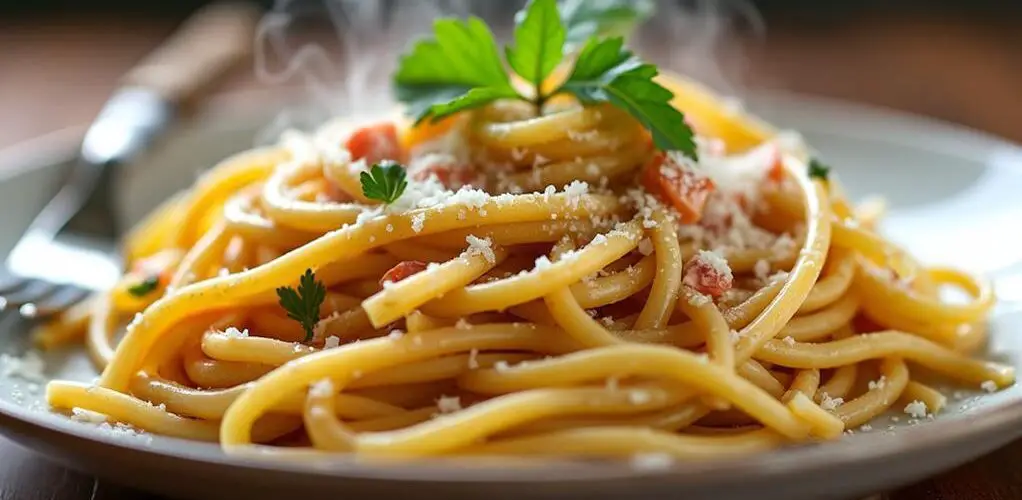
On a ketogenic diet, it is essential to avoid high-carb foods that can disrupt ketosis. These include refined carbohydrates like white bread and pasta, sugary beverages such as sodas and fruit juices, and sweeteners or syrups like honey and maple syrup. Starchy vegetables, grains, and legumes are also high in carbs and should be limited. Processed and snack foods, low-fat and diet products often contain hidden sugars. Additionally, high-carb fruits like bananas and grapes, and condiments with added sugars can hinder progress. Understanding these food categories is vital for maintaining ketosis and achieving dietary goals. Explore further for more insights.
Key Takeaways
- Avoid refined carbohydrates like white bread and pasta, which are high in carbs.
- Steer clear of sugary beverages, including regular sodas and fruit juices, to prevent insulin spikes.
- Limit starchy vegetables such as potatoes and corn due to their high carbohydrate content.
- Refrain from consuming sweetened dairy products like flavored yogurts and ice creams.
- Avoid high-carb fruits like bananas and mangoes to maintain low carb intake.
Refined Carbohydrates
Refined carbohydrates, prominent in many staple foods, pose considerable challenges for those adhering to a ketogenic diet. Foods such as white bread, pasta, white rice, and flour tortillas are notorious for their high carbohydrate content.
For instance, a single slice of white bread contains about 13 grams of carbs, while a cup of cooked pasta has approximately 33 grams of carbs. Consuming half a cup of cooked white rice involves ingesting about 26.5 grams of carbs, and a single white flour tortilla can contain as much as 36 grams of carbs. These levels of carbohydrate intake can greatly hinder the state of ketosis, a metabolic condition essential for the effectiveness of a ketogenic diet.
Additionally, high-carb breakfast foods like traditional cereals and oatmeal can also disrupt ketosis, making it essential to choose low-carb alternatives.
To mitigate these challenges, individuals can opt for carb alternatives that are low in refined sugars and carbohydrates. Cauliflower mash, for example, provides a similar texture to mashed potatoes but with a fraction of the carbs.
Additionally, low-carb bread options are available, offering a viable substitute for traditional high-carb bread. By integrating these alternatives, one can maintain a lower carbohydrate intake while still enjoying foods with familiar textures, consequently supporting the ketogenic dietary goals more effectively.
Sugary Beverages
Sugary beverages are a significant concern for those on a ketogenic diet due to their high carbohydrate content, which can cause hidden carbs to accumulate quickly.
These drinks can lead to rapid insulin spikes, effectively disrupting ketosis and hindering the diet's effectiveness.
Avoiding sodas, fruit juices, sweetened teas, and certain alcoholic beverages is essential to maintain a state of ketosis and achieve desired health outcomes.
Hidden Carbs Dilemma
While adhering to a keto diet, managing carbohydrate intake is essential, yet hidden carbs in beverages can present a significant challenge. Regular sodas, for instance, can contain as much as 39 grams of carbs per 12 oz can, which can severely hinder both ketosis and weight loss efforts.
Fruit juices, often perceived as healthy, are particularly deceptive due to high levels of natural sugars and low fiber content; a cup of orange juice can harbor around 26 grams of carbs. Additionally, certain alcoholic beverages, especially beer and mixed drinks with sugary mixers, contribute unexpectedly high carb counts—such as a piña colada with approximately 32 grams of net carbs.
Sweetened beverages, including seemingly healthy options like sweetened iced teas, can contain hidden sugars that cause rapid blood sugar spikes, complicating the maintenance of a low-carb intake necessary for ketosis.
To mitigate these issues, opting for beverage alternatives such as sugar-free sodas, sparkling water with natural flavors, or herbal teas can provide hydration without added sugars. These alternatives help maintain a low-carb intake, aligning more closely with keto diet principles and supporting overall health and diet goals.
Insulin Spike Risk
Understanding the impact of sugary beverages on insulin levels is critical for anyone committed to a ketogenic diet. Sugary beverages, such as regular soda, contain approximately 39 grams of carbohydrates per 12 oz can, which can greatly disrupt ketosis by causing rapid insulin spikes. These spikes can interfere with glucose metabolism and promote insulin resistance over time.
Fruit juices, although often perceived as healthy, are high in natural sugars and low in fiber, resulting in increased blood sugar levels and considerable insulin responses. This can be detrimental to maintaining a state of ketosis, where the body relies on fat rather than carbohydrates for energy.
Similarly, alcoholic drinks, particularly beer and sweet mixed cocktails, have high carbohydrate content that can hinder the body's ability to enter or sustain ketosis. These beverages not only spike insulin levels but can also lead to cravings for more sugary foods, complicating adherence to a ketogenic diet.
Moreover, consuming beverages with added sweeteners like honey or maple syrup introduces an additional 13-17 grams of carbohydrates per tablespoon, posing further risks of insulin spikes.
Hence, regular consumption of high-carb drinks can undermine the benefits of the ketogenic diet by fostering insulin resistance and disrupting glucose metabolism.
Sweeteners and Syrups
Maneuvering the landscape of sweeteners and syrups is essential for anyone adhering to a ketogenic diet. Traditional sweeteners such as honey and maple syrup are high in carbohydrates, with approximately 17g and 13g of carbs per tablespoon, respectively, making them unsuitable for a keto regimen.
Additionally, coconut sugar is high in fructose and impairs blood sugar control, further disrupting ketosis. These high carb counts can quickly disrupt ketosis, the metabolic state critical for the diet's effectiveness.
Moreover, condiments like ketchup and barbecue sauce can add hidden carbohydrates to meals, with around 3g and 4g of carbs per packet, respectively. These hidden carbs can accumulate rapidly, hindering progress in a ketogenic meal plan.
Flavored sauces and dressings are another concern, as they often contain significant amounts of sugar, leading to spikes in blood sugar levels that counteract the goals of a keto diet.
Artificial sweeteners might seem like a viable option; however, they can be misleading. While they may lack sugar, some can still affect insulin levels or contain hidden carbs, disrupting ketosis.
Consequently, it is essential to read labels carefully, as even "sugar-free" products may contain carbs that could exceed daily limits.
To summarize, careful consideration of sweeteners and syrups is crucial to maintain the efficacy of a ketogenic diet.
Starchy Vegetables
Starchy vegetables, such as potatoes, sweet potatoes, corn, and peas, pose a significant challenge for those adhering to a ketogenic diet. These vegetables are high in carbohydrates, which can quickly exceed the daily net carb limit of 20-50 grams vital for maintaining ketosis.
For instance, a medium potato contains approximately 37 grams of carbs, while sweet potatoes offer around 20 grams of carbs per 100 grams. Similarly, a cup of corn has about 25 grams of carbs, and peas provide around 12 grams of net carbs per cup.
In contrast, keto-friendly vegetables like spinach and kale contain less than 8 grams of net carbs per cup, making them suitable for maintaining ketosis. These alternatives are also nutrient-dense, providing essential vitamins and fiber.
The high carbohydrate content in these vegetables can disrupt ketosis, making it challenging to stay within the recommended carb limits. As a result, it is important to seek out low carb alternatives to guarantee nutritional balance while adhering to keto guidelines.
Leafy greens, cauliflower, and zucchini are excellent vegetable substitutions. Leafy greens are nutrient-dense and low in carbs, while cauliflower can be used as a versatile substitute for potatoes and rice. Zucchini, with its minimal carb impact, is ideal for various dishes, from zoodles to casseroles.
Prioritizing these low-carb alternatives can help maintain ketosis and support the ketogenic diet's goals effectively.
Grains and Legumes
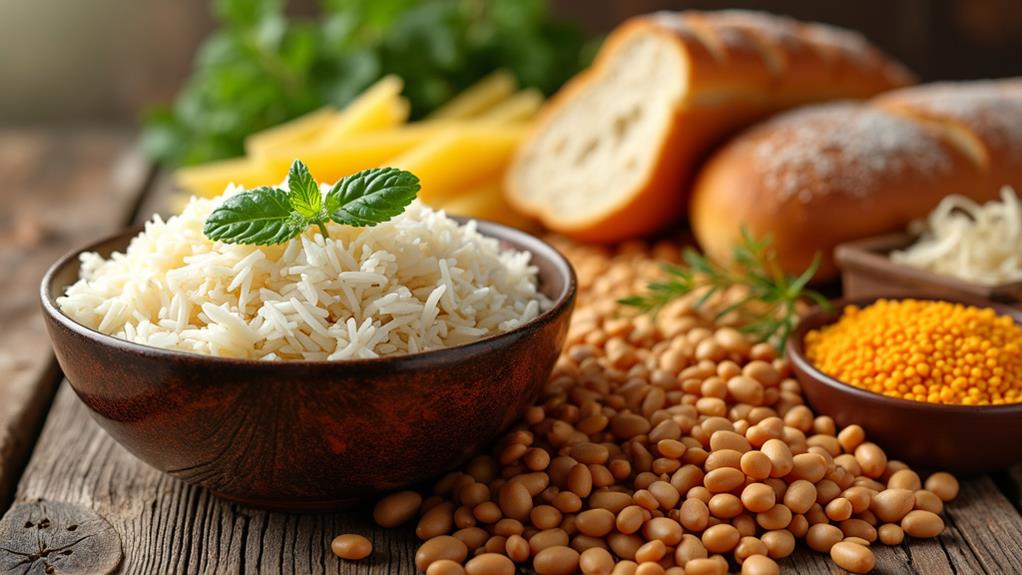
While starchy vegetables present a notable hurdle for those adhering to a ketogenic diet, grains and legumes pose an even greater challenge due to their high carbohydrate content.
Grains such as wheat, oats, rice, and barley are particularly problematic, with a single slice of white bread containing about 13 grams of carbs. Similarly, legumes, including beans, lentils, and chickpeas, are rich in carbohydrates; for example, chickpeas contain approximately 27 grams of carbs per cup, which can easily disrupt ketosis.
It's important to regularly track carbohydrate intake to avoid inadvertently consuming excess carbs, as hidden carbs in processed foods can also disrupt ketosis. The keto diet generally restricts daily carbohydrate intake to between 20-50 grams, making even small servings of these foods detrimental.
Whole grains like quinoa and barley, often lauded for their health benefits, also contribute significant carbs, with around 20 grams per half-cup cooked.
Here are four specific considerations:
- White Bread: Contains approximately 13 grams of carbs per slice.
- Chickpeas: Approximately 27 grams of carbs per cup.
- Quinoa and Barley: About 20 grams of carbs per half-cup cooked.
- Peas: Around 12 grams of net carbs per cup.
Opting for gluten-free alternatives and legume substitutes can help maintain ketosis while adhering to dietary preferences and restrictions.
Sweetened Dairy Products
Sweetened Dairy Products
Sweetened dairy products are a notable concern for those following a ketogenic diet due to their high carbohydrate content, primarily from added sugars. Flavored yogurts, for instance, often contain significant amounts of added sugars, with some varieties exceeding 20 grams of carbohydrates per serving. This high sugar content makes such products unsuitable for maintaining a state of ketosis, where carb intake must be kept minimal.
Additionally, hidden sugars in these products can further complicate efforts to stay within daily carb limits, leading to unintended carb intake.
Whole milk, another common dairy product, contains approximately 11 grams of carbs per cup, which can quickly contribute to surpassing daily carbohydrate limits on a keto diet. Moreover, many sweetened dairy alternatives, including ice creams and desserts, are typically processed and can contain upwards of 30 grams of sugar per serving, additionally hindering ketosis.
A more suitable option for those on a ketogenic diet is plain, unsweetened Greek yogurt, which contains around 8 grams of carbs per serving. It is essential to avoid flavored varieties, which can have approximately 15 grams of carbohydrates per serving.
When selecting dairy products, opting for full-fat, plain options such as heavy cream in moderation can help keep carbohydrate intake low. This approach guarantees adherence to the strict carb limitations required for a successful ketogenic diet.
Processed and Snack Foods
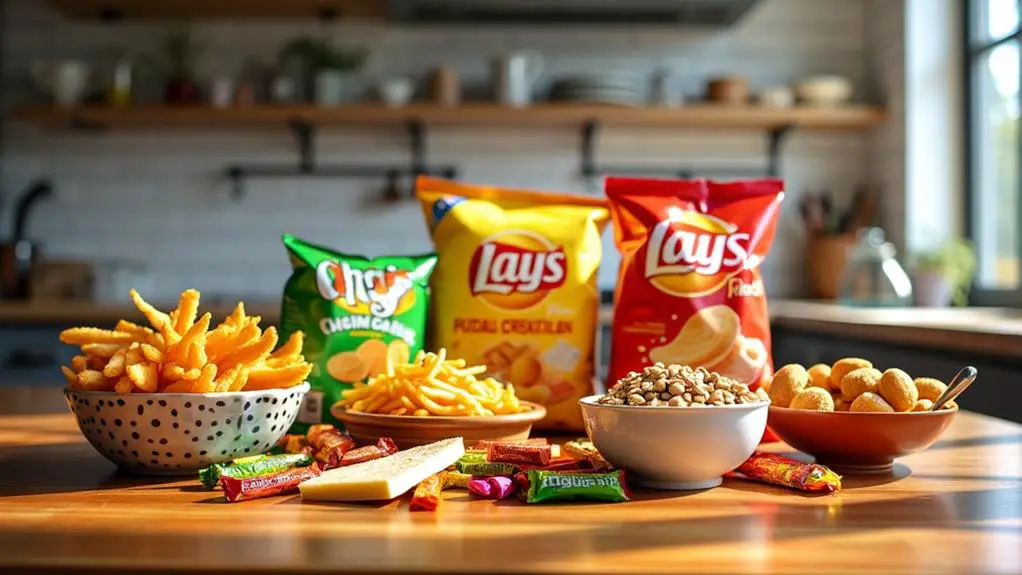
Processed and snack foods present considerable challenges for individuals adhering to a ketogenic diet due to their high carbohydrate content and the presence of hidden sugars. Common processed snacks such as chips and crackers frequently contain refined carbohydrates and sugars, making them unsuitable for maintaining ketosis.
Even granola bars, often marketed as healthy, can contain over 20 grams of carbs per serving, which disrupts the low-carb requirements of a keto diet. Many snack foods also cause spikes in insulin levels, which can counteract the appetite regulation benefits of a ketogenic diet.
Many store-bought snack mixes include dried fruits, which greatly increase carbohydrate intake. For example, just 1/4 cup of raisins can add around 29 grams of carbs. Similarly, pre-packaged cookies and pastries are often loaded with refined sugars and flours, with some varieties containing upwards of 30 grams of carbs per serving.
To guarantee healthy snacking while on a ketogenic diet, consider these keto alternatives:
- Nuts and Seeds: One ounce of almonds has only 2.6 grams of net carbs.
- Cheese: A convenient and low-carb snack option.
- Avocado: Rich in healthy fats and very low in carbs.
- Olives: Another low-carb, healthy fat option.
Low-Fat and Diet Foods
Steering a ketogenic diet can be challenging, especially when low-fat and diet foods are deceptively marketed as healthy choices. The low-fat misconceptions surrounding these products can mislead individuals into believing they are adhering to a keto-friendly regimen.
However, low-fat foods often contain added sugars to compensate for the lack of fat, leading to increased carbohydrate intake that can disrupt ketosis. For instance, common low-fat products such as yogurt and salad dressings frequently harbor hidden sugars, greatly raising their carbohydrate content.
Additionally, many low-fat snacks, like granola bars and crackers, are marketed as healthy yet contain high levels of refined carbohydrates, making them unsuitable for a ketogenic diet. The pitfalls of diet foods extend beyond their misleading labels.
These items may lack essential nutrients and satiety, compelling individuals to consume larger portions or seek additional snacks, ultimately hindering weight loss efforts. It is vital to read nutrition labels meticulously, as low-fat products can sometimes have similar or even higher carb counts than their full-fat counterparts.
For those committed to maintaining ketosis, understanding these low-fat misconceptions and diet foods pitfalls is essential for making informed dietary choices.
High-Carb Fruits
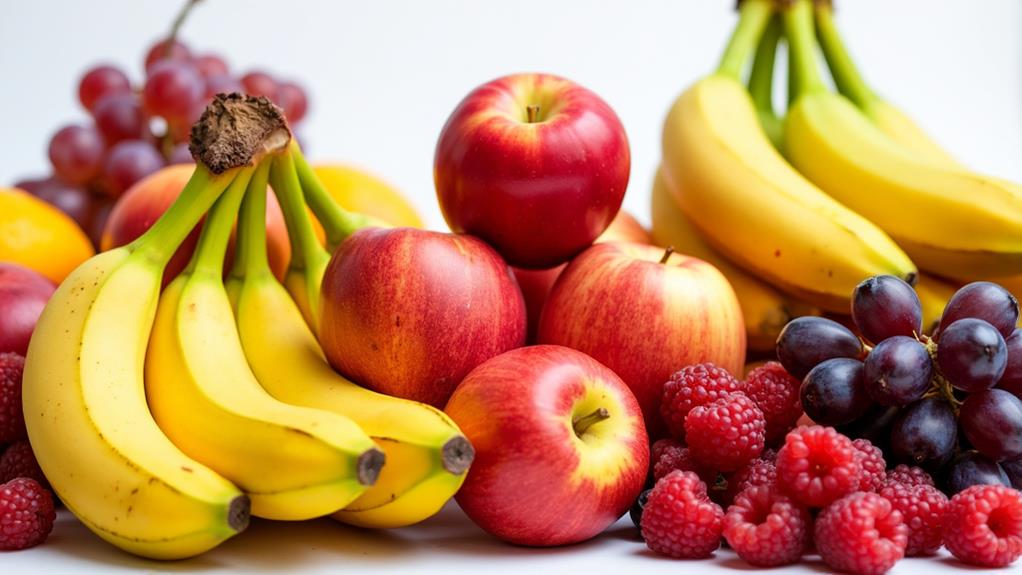
High-Carb Fruits
High-carb fruits pose a notable challenge for individuals adhering to a ketogenic diet due to their increased carbohydrate content. Consuming these fruits can quickly exceed the daily carb limit necessary to maintain ketosis. High-carb fruits can also affect blood sugar control and insulin levels, which are essential for managing metabolic conditions.
Here are some high-carb fruits that individuals should avoid:
- Bananas: A medium-sized banana contains approximately 24 grams of net carbs, making it unsuitable for a ketogenic diet.
- Grapes: With around 26 grams of net carbs per cup, grapes can greatly impact daily carb limits and should be avoided.
- Mangoes: Providing about 22 grams of net carbs per medium fruit, mangoes can disrupt ketosis and are best excluded from keto meal plans.
- Figs: Particularly high in sugars, a medium fig delivers about 27 grams of net carbs, necessitating their limitation or elimination on a keto diet.
Instead of high-carb fruits, individuals can explore fruit alternatives that fit within the low-carb guidelines of a ketogenic diet. Berries such as strawberries, raspberries, and blackberries are excellent options due to their lower carbohydrate content.
Integrating these low-carb fruits into creative low carb recipes can enhance dietary variety and maintain ketosis. By making informed choices, individuals can enjoy the benefits of a ketogenic diet without compromising their nutritional goals.
High-Carb Condiments
High-carb condiments such as sugary salad dressings, sweetened ketchup varieties, and high-carb barbecue sauce can greatly hinder your progress on a ketogenic diet due to their substantial sugar content.
For instance, ketchup contains about 3 grams of carbs per packet, while barbecue sauce can add around 4 grams per packet, primarily from added sugars.
To maintain ketosis, it is recommended to choose low-carb alternatives like olive oil or vinegar-based dressings, which generally have minimal to no carbohydrates.
Sugary Salad Dressings
Many commercially available salad dressings are laden with hidden sugars, making them a significant source of unwanted carbohydrates on a ketogenic diet. These hidden sugars can derail your efforts to maintain ketosis, with some dressings containing up to 8 grams of sugar per 2 tablespoons.
Consider these points:
- High-Carb Content: Common dressings such as ranch or honey mustard can have 2-4 grams of net carbs per serving, posing a challenge for those adhering to a strict keto regimen.
- Added Sweeteners: Store-bought dressings often contain high fructose corn syrup or other sweeteners, which contribute to their high carbohydrate content and compromise keto principles.
- Misleading Options: Even vinaigrettes, which are often perceived as healthier, can be deceptive. For example, some balsamic vinaigrettes contain 4-6 grams of sugar per tablespoon.
- Healthy Alternatives: Opting for homemade dressings is a prudent choice. Using ingredients like olive oil, vinegar, and herbs allows for better control over carbohydrate intake and guarantees adherence to keto guidelines.
Sweetened Ketchup Varieties
Sweetened ketchup varieties, a common fixture in many households, pose a vital challenge for those adhering to a ketogenic diet due to their high carbohydrate content. These ketchups often contain around 3 grams of carbohydrates per packet, primarily from added sugars such as high-fructose corn syrup, which markedly increases their carbohydrate content compared to unsweetened options.
A typical serving, approximately one tablespoon, can have about 4 grams of carbs, rapidly accumulating and potentially disrupting ketosis.
For individuals committed to low-carb eating, carbohydrate awareness is essential. Many commercially available ketchups can undermine a ketogenic diet due to hidden sugars and high-carb ingredients. To maintain ketosis, it is important to scrutinize ingredient labels meticulously.
Some "low-carb" condiments may still harbor ingredients that spike carbohydrate intake unexpectedly.
Fortunately, there are ketchup alternatives that cater to keto dieters. Sugar-free or low-carb ketchups often contain less than 1 gram of net carbs per serving, providing a flavorful option without compromising dietary goals.
High-Carb BBQ Sauce
Maneuvering the landscape of high-carb condiments, BBQ sauce emerges as a particularly challenging obstacle for those adhering to a ketogenic diet. High-carb BBQ sauces often contain up to 16 grams of carbohydrates per two-tablespoon serving, primarily due to added sugars and sweeteners. A commonly used ingredient in many commercial varieties is high-fructose corn syrup, which greatly increases the carbohydrate content, making it a poor choice for keto enthusiasts.
Even sugar-free BBQ sauces are not without pitfalls, as they may harbor hidden carbs from other sweeteners or thickeners. This underscores the importance of ingredient awareness and meticulous label reading. A typical serving can induce blood sugar spikes, potentially disrupting ketosis and impeding weight loss efforts.
Considering these factors, opting for homemade alternatives is a prudent strategy. By crafting BBQ sauce at home, you can exercise better control over the carbohydrate content, utilizing low-carb substitutes like sugar alternatives or natural spices.
Here are key points to remember:
- Check labels for high-fructose corn syrup.
- Be cautious of hidden carbs in sugar-free options.
- Monitor serving sizes to avoid blood sugar spikes.
- Consider homemade alternatives for better carb control.
Frequently Asked Questions
What Foods Are Not Allowed on Keto Diet?
Common keto diet misconceptions include the allowance of high carb snacks. Foods not permitted include high-carb grains, starchy vegetables, legumes, sugary beverages, and high-sugar fruits, as they disrupt ketosis by exceeding carb limits.
What Foods Can You Eat Unlimited Amounts of on Keto?
On a keto diet, you can consume unlimited amounts of keto-friendly snacks such as bone broth and low-carb vegetables like spinach, kale, and broccoli. These options offer essential nutrients while maintaining low carbohydrate intake, supporting ketosis.
What Are the Top 10 Keto Foods?
The top 10 keto foods for effective keto meal prep and keto snack ideas include: fatty fish, low-carb vegetables, avocados, full-fat dairy, nuts, seeds, eggs, olive oil, coconut oil, and grass-fed meat.
Can I Eat a Banana on Keto?
Eating a banana on keto is not recommended due to its high carbohydrate content. Consider banana alternatives such as keto fruit options like berries, which contain considerably fewer net carbs, supporting ketosis and weight loss objectives.
Conclusion
In summary, adherence to a ketogenic diet necessitates the avoidance of certain food categories that are high in carbohydrates and sugars. These include refined carbohydrates, sugary beverages, sweeteners, syrups, starchy vegetables, grains, legumes, processed and snack foods, low-fat and diet foods, high-carb fruits, and high-carb condiments. Eliminating these items is essential for maintaining ketosis and achieving the metabolic and health benefits associated with the ketogenic dietary regimen.
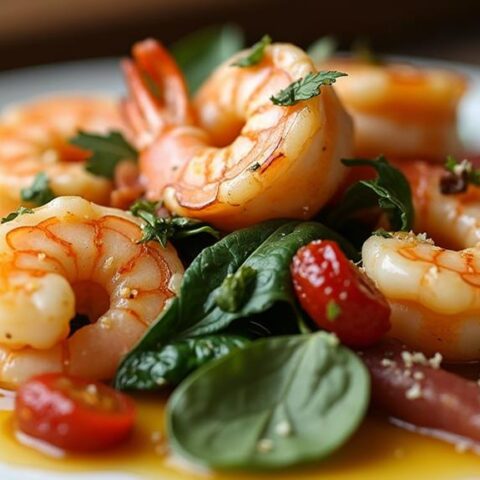
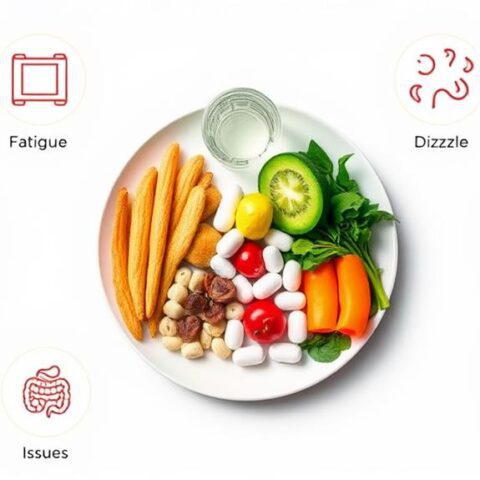
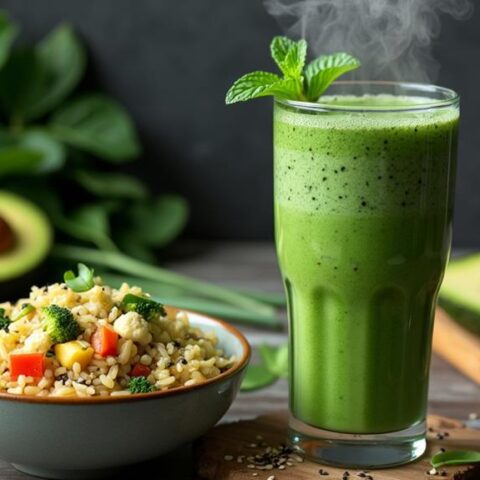


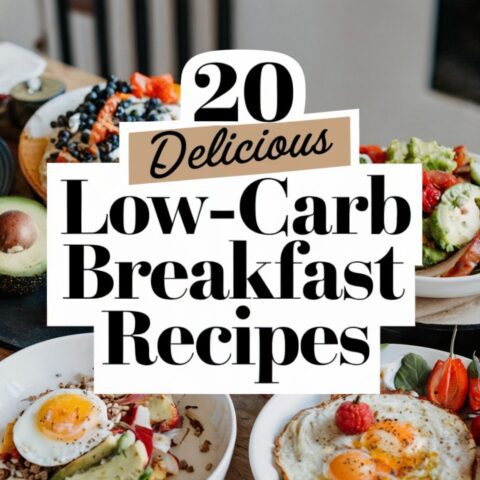




No Comments